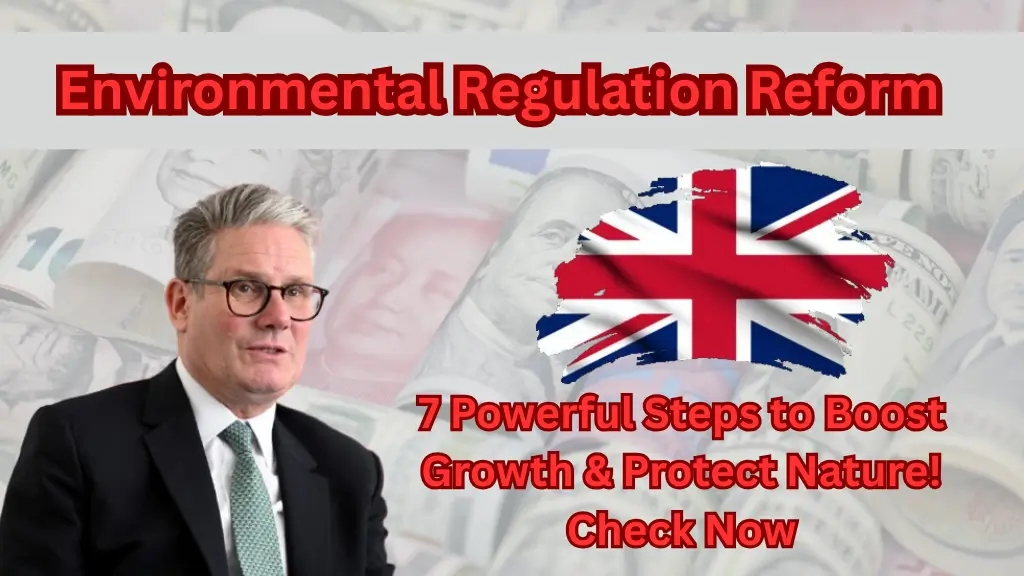In today’s dynamic economy, Environmental Regulation Reform is emerging as a key driver for unlocking economic growth while simultaneously safeguarding our natural world. As detailed in the recent announcement by the Department for Environment, Food & Rural Affairs and Environment Secretary Steve Reed, the government is set to revolutionize the regulatory framework to deliver 1.5 million homes, boost infrastructure projects, and enable robust nature restoration initiatives. This comprehensive reform plan is designed to modernize outdated systems and create a streamlined process that benefits businesses, developers, and conservationists alike.

1. A Unified Lead Regulator for Major Projects
One of the cornerstone proposals in the reform is the introduction of a single, lead regulator for major infrastructure projects. This initiative is intended to eliminate the lengthy, multi-agency approval process that currently hinders growth. By designating one primary authority, developers will no longer face a “merry-go-round” of permissions, thereby significantly reducing delays and saving millions in both time and resources.
External Link: For more details on similar regulatory changes, see the UK Government’s official updates (DoFollow).
2. Revamping Environmental Guidance
To ensure clarity and eliminate duplicative processes, the government plans to review and update the existing catalogue of compliance guidance. This includes guidance on protecting species such as bats, where overlapping rules have historically created confusion. Streamlined guidance will help ensure that both developers and conservation groups have a clear, actionable set of standards to follow, ultimately accelerating development projects while promoting nature recovery.
3. Streamlined Permits and Guidance
A critical aspect of the Environmental Regulation Reform is the overhaul of the Environmental Permitting Regulations. By adopting a risk-based approach, regulators will be able to exempt low-risk and temporary projects from burdensome permits, effectively cutting red tape and accelerating project approvals. This reform is particularly beneficial for small-scale projects and innovative developments that may not require the full spectrum of regulatory oversight.
4. Upgraded Digital Systems with a Planning Permit Portal
As part of the modernization effort, a single, integrated digital portal for planning permits will be introduced. This centralized platform will allow developers and environmental agencies to access planning advice and submit applications through one unified system. The portal will not only speed up the approval process but also enhance transparency and build trust between the government, businesses, and the public.
5. Establishing a New Defra Infrastructure Board
The creation of a dedicated Defra Infrastructure Board aims to foster greater collaboration between regulators and streamline major infrastructure projects from the early stages. This board will serve as a high-level oversight committee to identify and remove barriers to development, ensuring that environmental goals are met without sacrificing the pace of progress.
6. Empowering Nature Groups with More Autonomy
In an innovative move, trusted nature groups will be granted increased autonomy to execute conservation and restoration projects without the need for multiple permissions. A pilot program between Natural England and the National Trust is set to reduce the bureaucratic hurdles that currently delay large-scale environmental initiatives. This step will enable organizations to implement nature recovery projects more swiftly and effectively, directly contributing to the government’s ambitious environmental targets.
7. Boosting Green Finance through a Nature Market Accelerator
Recognizing the vital role of finance in environmental projects, the government is launching a Nature Market Accelerator. This industry-funded initiative will consolidate various nature markets, driving investment into environmental projects and creating a coherent framework that supports both economic growth and biodiversity improvement. With robust financial backing, businesses can confidently invest in initiatives that deliver dual benefits—enhanced natural habitats and sustained economic development.
Long-Term Impact of Environmental Regulation Reform
The reforms set forth under this plan reflect a holistic approach that marries economic growth with environmental sustainability. By reducing complexity and streamlining regulatory processes, the government aims to eliminate barriers that have historically slowed down development and nature conservation efforts. The continuous program of regulatory reform will ensure that the system evolves with changing needs, delivering long-term benefits that include:
- Economic Growth: Faster approvals, reduced legal costs, and more efficient project management will stimulate business investments and infrastructure development.
- Housing Delivery: By expediting the planning process, the government expects to unlock the construction of 1.5 million new homes, addressing critical housing shortages.
- Nature Recovery: More agile and focused conservation efforts will help restore declining natural habitats, support biodiversity, and enhance environmental quality.
External Link: For additional insights on environmental policies and their economic impact, explore research from the World Economic Forum (DoFollow).
Conclusion
The Environmental Regulation Reform initiative marks a significant turning point for the United Kingdom’s approach to both economic development and environmental stewardship. By embracing modern regulatory practices, this reform paves the way for accelerated growth, efficient infrastructure projects, and meaningful nature restoration. The collaborative efforts between government agencies, developers, and conservation groups highlight a promising future where progress and environmental protection go hand in hand.
As a finance news writer at sirfal.com, I specialize in breaking down complex economic trends, market updates, and investment strategies into clear, actionable insights. My mission is to empower readers with the knowledge needed to make informed financial decisions. Thank you for engaging with my articles; I hope they add value to your financial journey.